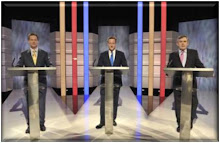
French side wrangle with Uefa
The domestic season will soon be upon us and rest assured – CollinsBeans will have all the comment and features you need. More details will follow shortly.
In the meantime, we have stumbled across a very interesting article in, of all places, the FT. It concerns French team Evian (yes, they are named after the water) and the struggles they are having with Uefa.
I’ll let the actual article (see below) do the talking, but in a nutshell, Evian need to move to a bigger ground and thought they had found the perfect solution, taking residence in the nearby Stade de Geneve. Sadly, Uefa have stepped in. It raises some interesting questions about borders and the EU. Yes, we cover the serious issues on this site too…
Uefa blocks Evian proposal
By Haig Simonian in Zurich
It was a Saturday afternoon, and Servette, the ailing Swiss second division football club based in Geneva, had managed to fill barely 3,000 of the 30,000 seats at the swish Stade de Genève arena.
Meanwhile, just across the border in France, Évian Thonon Gailliard – better known as Evian – had won promotion to the second division but had nowhere befitting its new status to play.
The answer looked obvious: why should Evian, based just 35km away, not play in Geneva’s lavish new stadium? It had been built to the highest international standards for the 2008 European Championship co-hosted by Switzerland and Austria.
The idea was hugely popular among fans and local politicians and this summer the French and Swiss national football authorities gave it their blessing.
But Europe’s football bureaucrats had other ideas, and Uefa the European football association, has astounded backers on both sides of the border by vetoing the plan. “The organisation of football on a national territorial basis constitutes a fundamental principle and a well-established characteristic of the sport,” Uefa said.
Evian’s manager, Patrick Trotignon, says he will fight the decision and take legal action.
The episode highlights the growing divide between a large and rigid footballing bureaucracy wedded to traditional national structures and smaller clubs seeking innovative ways to meet their needs in an increasingly borderless Europe.
Mr Trotignon says the principle of cross-border competition appears to cause no problems in other sports, such as rugby. “The Biarritz team regularly use a stadium in Spain,” he notes. “Uefa’s decision is completely out of keeping with the spirit of growing cross-border co-operation in Europe.”
The plan for Evian had seemed a perfect solution for a club whose star is in the ascendant. Evian’s remarkable rise began when Danone, the French foods group that has the rights to bottle Evian’s mineral water, signed a multi-year sponsorship deal.
“Four years ago, the club was threatened with bankruptcy and asked us for help,” says Laurent Sacchi, head of communications at Danone, which does not own the team but pays a third of its running costs. “We agreed, subject to conditions, such as developing a broader regional identity and aiming much higher.”
Mr Trotignon, who has had success with smaller teams, was appointed manager. The club’s name, which had gone through a string of obscure local titles, was changed to Evian to boost its regional identity and Danone’s brand.
Once the team reached the second division, the French professional football association deemed its modest home stadium, with 2,700 seats and a maximum 5,000 capacity, unsuitable for its status.
Geneva suited because the city is far closer than Annecy or Grenoble, the only two French alternatives for the team. Ties between French-speaking Switzerland and France are strong. The stadium has its own railway station and direct motorway access. “It would have been a perfect solution for all concerned,” says Benoît Genecand, the stadium’s head.
Marc Francina, Evian’s mayor and a French parliamentarian, was one of many backers. “I’d prefer to see the team play in Geneva than Annecy or Grenoble. We’re all based around Lake Geneva and it’s all one region,” he said.
Football fans concurred: “it’s a very good stadium and easy to reach,” said David Costa, chairman of Evian’s supporters club.
The failure of the plan given such overwhelming support has astonished its supporters.
With the French football season starting on August 8, Evian has no choice but to play in Annecy, in spite of the fact that the town’s stadium needs more than €1m ($1.3m, £852m) of repairs. “The proposal was strongly supported by all involved,” says Mr Trotignon. “The reasons for rejection are incomprehensible.”










This is a fascinating subject. You could drive a bus through UEFA and FIFA’s rules on membership and nationality. More and more people around the world identify more with their local and regional identities than the classic idea of the 19th century nation state, and as football is the most popular way of self expression for people, the idea of a ‘national team’ is changing ever more. For a more in-depth discussion of topics like this, I would recommend reading Steve Menary’s excellent book ‘Outcasts – the lands that FIFA forgot’ or reading his blog: http://outcasts-book.blogspot.com/
ReplyDelete